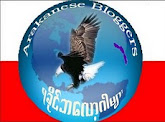
The red shirts say they are battling for justice against a privileged elite
As Thailand prepares for a weekend of political demonstrations, the BBC's Rachel Harvey travels to the heartland of the country's ousted prime minister.
It's been three-and-a-half years since Thaksin Shinawatra was deposed in a military coup.
But in Udon Thani province, in Thailand's north-east, the former prime minister's removal from power has neither been forgotten nor forgiven.
 |
Mr Thaksin is currently living in exile in Dubai, avoiding a jail term imposed for corruption. Despite his absence he is still afforded a rock-star status here.
'Final chance'
A big field in the centre of Udon Thani was still ablaze with floodlights and political fervour late into the night.
From the leaders on stage to the rows of enthusiastic supporters sitting on the grass, everyone was wearing a red shirt. It's the uniform of choice for Thaksin Shinawatra's supporters.
 Mr Kwanchai has been trying to raise the much needed cash for the rally |
One of the leaders whipping up the crowd, Kwanchai Praipana, had earlier in the day been using the airwaves to spread the word via red shirt radio. For days the small station, based in a local community centre, has been broadcasting appeals for cash donations to get protesters to Bangkok.
The aim of the rally is to force the current coalition government from power.
"This is it," Mr Kwanchai said, "this will be the last gathering. We've given everything for three years and we don't have much energy left. We will fight, but it will be peaceful."
Government's warning
The last time the red-shirts gathered in large numbers, in April last year, the rally degenerated into a riot. Two people were killed and several more injured.
| Thongsi, Thaksin Shinawatra's supporter |
The government spokesman, Panitan Wattanayagorn, told the BBC it was a necessary precaution.
"We don't expect agreement on all issues, but they (the protestors) need to respect the rule of law, they need to respect other people's rights," he said.
"In every society we see small numbers of people who believe in using violence as a means to certain ends, we need to block these people. If we can successfully contain this, I think the demonstration will be peaceful."
Big test
The challenge for the red shirt leaders is to manage the undeniable anger felt by many of their rank-and-file.
 Thongsi says the protesters want to bring back Thaksin |
Prachob was splitting bamboo to make a basket, occasionally leaning over to borrow the one pair of reading glasses the couple share, as his wife explained her devotion to Thaksin Shinwatra.
During his time in power, Thaksin introduced cheap healthcare for the poor. That allowed Prachob to get the help he needs for his epilepsy.
"My husband is sick but he's still going to the rally," Thongsi said, her voice cracking with emotion. "We want to play our part, to try to bring back Thaksin." Her hero's political exile is still a raw wound.
The next day Thongsi and Prachob patiently waited in the midday sun for their place on a vehicle heading for the Bangkok rally. Leaders with loud hailers manoeuvred flatbed trucks and mini-vans into position in the convoy.
Red flags, red banners, and red-shirted people competed for space.
"I'm very excited to be going to Bangkok," Thongsi said as she picked up her provisions of food and water. "I'm fighting for democracy and to bring back my beloved Thaksin."
The red shirts say they are battling for justice against the entrenched interests of a privileged elite.
But over the next few days they face a test. Can they show the world that they are, as they claim, a peaceful movement for social change and not just a vehicle for the political ambitions of one man?
Ref: BBC










0 comments:
Post a Comment